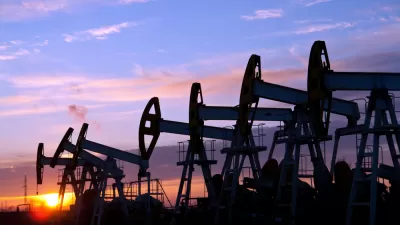An energy policy developed during the 1983 Arab oil embargo is loosening thanks to an order by the Commerce Department, though not as much as oil companies would like. Will gas prices rise? No, they will fall, argues energy expert Daniel Yergin.
"The Obama administration cleared the way for the first exports of unrefined American oil in nearly four decades, allowing energy companies to start chipping away at the longtime ban on selling U.S. oil abroad," write Christian Berthelsen and Lynn Cook on two Commerce Department rulings that have yet to be made public as of June 24.
Two energy companies, Pioneer Natural Resources Co. and Enterprise Products Partners LP, were authorized to ship limited amounts of a "type of ultralight oil known as condensate to foreign buyers." There is no ban on the export of refinery products, e.g. gasoline and diesel fuel.
The oil ban was initiated by President Nixon as a result of the 1973 Arab oil embargo. "The embargo caused oil prices to quadruple and led to rationing at gas stations across the U.S.," write Berthelsen and Cook. Two years earlier, the president had applied wage and price controls. The gasoline price controls were lifted by President Reagan in 1981, causing prices to soar.
Thanks to fracking and horizontal drilling, oil production has boomed. "(S)o much oil is flooding out of the ground that prices for ultralight oil have fallen as much as $10 or more below the price of traditional crude. As a result, producers have lobbied aggressively to relax the export ban, saying they could get a higher price from foreign buyers than from U.S. refiners."
Jennifer A. Dlouhy of Fuel Fix writes that "(t)he decision falls far short of what oil producers and some of their allies in Congress have been urging — including a wholesale repeal of the trade limits on crude. But it could provide a new avenue for the ultra-light condensate that flows along with crude out of many Texas wells tapping the Eagle Ford Shale."
Will gas prices rises if crude oil is exported. Energy Expert Daniel Yergin (author of "The Quest" and "The Prize") and Kurt Barrow argued earlier in their Wall Street Journal Opinion just the opposite - prices will fall.
While it may seem paradoxical, exporting U.S. crude will increase, not reduce, domestic oil supplies and lower, not raise, domestic gasoline prices.
Yergin and Barrow ask, "Yet the U.S. still imports about 30% of its oil. So why allow exports?"
The reason is that the new crude being produced—so called tight oil, or "light oil" recovered by hydraulic fracturing and horizontal drilling—is a poor match for refineries in the Midwest and along the Gulf Coast. We estimate that removing the export ban, combined with continuing innovation in production technologies, would lead to as much as 2.3 million barrels per day of additional production over the next 15 years.
Correspondent's note: Links to the two Wall Street Journal articles should allow full access to non-WSJ subscribers through July 1.
FULL STORY: U.S. rules to loosen four-decade ban on oil exports

Pennsylvania Mall Conversion Bill Passes House
If passed, the bill would promote the adaptive reuse of defunct commercial buildings.

Coming Soon to Ohio: The Largest Agrivoltaic Farm in the US
The ambitious 6,000-acre project will combine an 800-watt solar farm with crop and livestock production.

World's Largest Wildlife Overpass In the Works in Los Angeles County
Caltrans will soon close half of the 101 Freeway in order to continue construction of the Wallis Annenberg Wildlife Crossing near Agoura Hills in Los Angeles County.

California Grid Runs on 100% Renewable Energy for Over 9 Hours
The state’s energy grid was entirely powered by clean energy for some portion of the day on 37 out of the last 45 days.

New Forecasting Tool Aims to Reduce Heat-Related Deaths
Two federal agencies launched a new, easy-to-use, color-coded heat warning system that combines meteorological and medical risk factors.

AI Traffic Management Comes to Dallas-Fort Worth
Several Texas cities are using an AI-powered platform called NoTraffic to help manage traffic signals to increase safety and improve traffic flow.
City of Costa Mesa
Licking County
Barrett Planning Group LLC
HUD's Office of Policy Development and Research
Mpact Transit + Community
HUD's Office of Policy Development and Research
Tufts University, Department of Urban and Environmental Policy & Planning
City of Universal City TX
ULI Northwest Arkansas
Urban Design for Planners 1: Software Tools
This six-course series explores essential urban design concepts using open source software and equips planners with the tools they need to participate fully in the urban design process.
Planning for Universal Design
Learn the tools for implementing Universal Design in planning regulations.
























